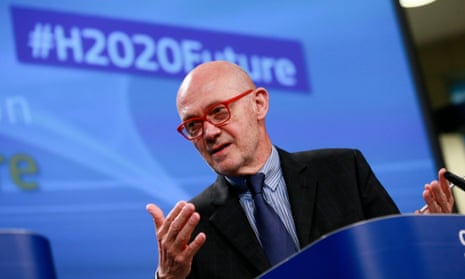The British government has been warned by a Brussels political veteran not to make the “mistake” of cutting itself adrift from EU scientific programmes after Brexit.
Pascal Lamy, a former EU commissioner and two-time head of the World Trade Organisation, said everyone would lose out if the UK chose to end European scientific ties.
“It would be a mistake for the UK to separate from the European Research Area,” he said in an interview with the Guardian and other European newspapers. “It would be a big mistake for both sides, so we have to be creative and find a new system.”
Lamy, who had an inside seat during the creation of the single market in the 1980s, called for the UK and EU to seek “full and continued engagement” on scientific collaboration, as he published a report on the future of EU research funding.
The European Research Area promotes the free movement of scientists, ideas and technology across the continent. Separately, the EU runs an €80bn (£70.2bn) research funding programme, which is supporting the work of nearly 6,500 UK-based scientists.
British science has been among the biggest beneficiaries of EU research funds: between 2007-13, the UK paid €5.4bn (£4.7bn) to the research budget and received €8.8bn (£7.7bn) in grants.
Lamy said his recommendation for the UK to remain part of the European Research Area had been vetted by the EU’s chief Brexit negotiator, Michel Barnier.
“It is probably an area where it is obvious that we need them and they need us,” he said, adding that devising a model of cooperation was not likely to be “as complex as fishing rights or standards on pesticide residues for flowers”.
Carlos Moedas, the European research commissioner, said Britain’s future scientific links with the EU would only be resolved through the Brexit negotiations. “Reality is kicking in and everyone is very sad about it – the European scientists and the UK scientists.”
Following the Brexit vote, the government promised to guarantee EU-funded projects, including science, until 2020 – the end of the current European funding cycle.
Science and research is one of many issues to be tackled during the second phase of negotiations, after the UK and EU have reached an outline deal on the main divorce issues – EU citizens, money and the Irish border.
In theory, research should be one of the easier topics, as Theresa May has said she welcomes collaboration on science and research, while also hinting that payments into some EU programmes may be necessary.
Scientists are not only worried about the loss of grants, but restrictions on the free movement of people that could damage the UK as a hub for scientific collaboration.
The EU hopes to keep the UK close on science, as it seeks to be open to the world. Non-EU Switzerland, Norway and Israel are among 16 associate members of the EU research funding programme, while Lamy has suggested opening the door to Canada and Australia.
Being an associate member of the EU’s next research programme would require contributions to the EU budget, while having no say on strategic decisions or the budget.
Senior academics told the House of Lords in early 2016 that associate membership would diminish the UK’s influence and could reduce the chances of British firms being able to exploit the commercial spin-offs from science.
The Lamy report, which calls for EU research funding to double to €160bn after 2020, underscores how the EU is debating its future without the UK.
Lamy expressed confidence EU leaders would back his calls for extra research funds, despite a looming budget crunch caused by Brexit.
The EU faces a budget shortfall of €20bn a year once the UK leaves, while some net-contributing countries have already made clear they will not fill the gap.
